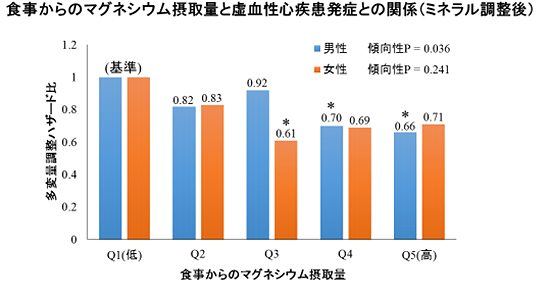News
Magnesium-Rich Diet Would Lower Heart Disease Risk Updated in October 2017
People who take a lot of magnesium in their diet may face lower risk of ischemic heart disease like myocardial infarction compared to those who take less magnesium. This fact was presented through a large-scale survey conducted by the research group consisting of Japan’s National Cancer Center and National Cerebral and Cardiovascular Center. The research group expect that by taking sufficient magnesium through food, one can prevent ischemic heart disease.
The research group tracked down approximately 85,000 men and women aged 45-74 years old who live in 8 prefectures of Japan (Iwate; Akita; Ibaraki; Nagano; Niigata; Kochi; Nagasaki and Okinawa prefecture). As a result, 1,283 people had ischemic heart disease like myocardial infarction, and 4,110 people suffered from strokes like cerebral infarction. The group analyzed the relationship between the sufferers of the disease and the amount of magnesium they took.
In the analysis, the amount of intake was compared among 5 groups. As a result, the risk of ischemic heart disease was reduced by 34% in men 's group with the highest intake (see Q5 in the graph below) compared with the group with the lowest intake (Q1). In women, the risk of onset was lowest in the group with the moderate intake (Q3). The Women’s group with the highest magnesium intake (Q5) also had fewer cases of onset compared to the group with the lowest intake (Q1). No significant association was found between incidents of strokes and magnesium intake.
Fish, fruits, vegetables and soybeans are rich in magnesium. According to the research group, magnesium deficiency is associated with several factors that cause ischemic heart disease, such as elevated blood pressure, decreased blood sugar metabolism, arteriosclerosis and abnormality in lipid metabolism (metabolism of fatty acids).

Q1 Low intake Q3 Moderate intake Q5 High intake Blue: Men Orange: Women
Graph provided by National Cancer Center Japan







